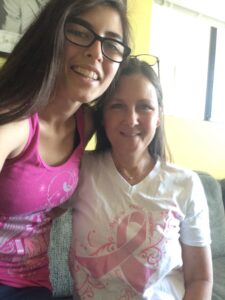In honor of breast cancer awareness month, we are proud to share one young woman’s personal journey to uncover the roots of her family tree and face the real possibility of breast cancer in her future.
By Sedona Lercara
This crazy journey all began nearly twenty years ago with my mom’s first diagnosis with breast cancer. Like many young women, her initial tests came back inconclusive, and at 33, with no family history, doctors were doubtful that she could have cancer. Seeing as these events occurred when I was three, I have little memory of them, but the story I have been told is that my mother was hesitant to believe the doctors; she didn’t feel “right†with the mass in her and insisted they take it out, benign or otherwise. The mass was biopsied as cancer and her journey down the chemo road began.

A year and a half later, not long into remission, she found another mass in the other breast. This time the doctors didn’t second guess that it was cancer, but had a hunch that there was more to it than “bad luckâ€. Myriad had recently come out with their direct sequencing genetic test for BRCA1 and 2. Well, the results were surprising; she tested positive for the 6174delT BRCA2 mutation, which occurs in 1.5% the Ashkenazi Jewish population.
But my mom is Catholic and knew of no one in the family tree who was Jewish. Nor could she find any history of cancer in the family. It took a little digging, but the veil of confusion was lifted from our family tree when she discovered that the previous few generations were Christian Scientist and didn’t believe in going to the doctor when ill, making it difficult to pinpoint a cancer diagnosis. Still, after some more digging our family history became even more convoluted by learning that our distant relatives had actually escaped religious persecution during World War II. They had been Jewish and changed their last name in hopes of staying safe. Kutner (a quick Google search confirms its German Jewish origin) was changed to Courtney, hiding the history and religious affiliation with it.
When my mom found out she was BRCA+, I was 5. A basic understanding of genetics implies a 50% chance that I will have inherited this gene from my mom. So, I’ve known for many years that I could be tested. However, experts recommend the BRCA genetic test for adults and not children. So I looked forward to August 15th, 2011 (my 18th birthday) to discover my status. But, my mom felt she “knew†I was positive for the mutation and wanted to wait as long as possible for the dreaded confirmation. In 2013, we were approached by a documentary crew to film the process. It seemed like as good a time as any.
That summer we began the process. Nearly a month after my genetic counseling session, in which a spit sample was taken and sent to be tested, I found out that I too am BRCA2+. I have since gone to a conference with hundreds of other BRCA+ women, many of whom had preventative mastectomies (giving them a lower chance than the general public of ever developing breast cancer). Others had gone through the experience of cancer. Several generations were at these events; mothers, daughters and grandmothers all showed up to become more educated on the implications of their genetics and how a single deletion relates to cancer. The deletion in my BRCA2 gene stops an important protein from being made, and that makes cancer more likely.
Some facts I learned at the conference: possessing a BRCA mutation greatly increases the risk of breast and ovarian cancer compared to the general population. Prostate, skin and pancreatic cancer risk is also heightened (which at best has a 14% 5 year survival rate… and at worst a 1% chance). Research on the BRCA 1 and 2 mutations has been ongoing since the genes were found 20 years ago. We now know that the lifetime cancer risk for women with a BRCA1 or 2 mutation is between 45-87%, compared to the average risk of 12% that all women face. If we accept the higher end statistic (87%), then I have a 13% chance of NOT developing cancer in my lifetime… that is opposite of the “normal populationâ€.
So the BRCA2 gene I inherited from my mom is faulty (as shown by the increase in several different types of cancers). Luckily, the gene I inherited from my dad still works. But at best, that means I’m working at half capacity. Doctors recommend that I begin biannual screening for breast cancer when I am ten years younger than my mom when she had her first diagnosis. The screening protocol involves mammograms and ultrasounds. That date is about a year from now and approaching rapidly. I worry these biannual check ups will cause additional harm due to excessive exposure to radiation. I plan on living at least another 60 years, which means a lot of imaging in my future.
